知识重点Unit2
译林高一必修一unit2知识点

译林高一必修一unit2知识点译林高一必修一Unit 2知识点一、单词和短语:1. immigrant 移民2. ethnic group 种族群体3. beneath 在...下面4. equivalent 相等的,等值的5. sphere 球体,范围,领域6. evolve 发展,进化7. identity 身份,个性8. diverse 不同的,多样化的9. abandon 放弃,抛弃10. heritage 遗产,传统11. clash 冲突,碰撞12. concept 概念,观念13. confuse 使困惑,混淆14. prejudice 偏见,歧视15. pollute 污染16. scarce 稀缺的,不足的17. desire 欲望,愿望18. expose 暴露,揭露19. perspective 观点,透视20. reputation 名声,声誉二、重点句型:1. The number of immigrants is on the rise.移民人数正在增加。
2. They live in the area beneath the hill.他们住在山下的地区。
3. The equivalent of the word "book" in Chinese is "书"."book"这个词在中文中的相等词是“书”。
4. The concept of time is relative.时间的概念是相对的。
5. Different ethnic groups have different cultural heritages.不同的种族群体有不同的文化遗产。
6. It is important to expose students to different perspectives.让学生接触不同的观点非常重要。
7. The pollution in this area is becoming increasingly serious.这个地区的污染正在变得越来越严重。
七年级unit2重要知识点
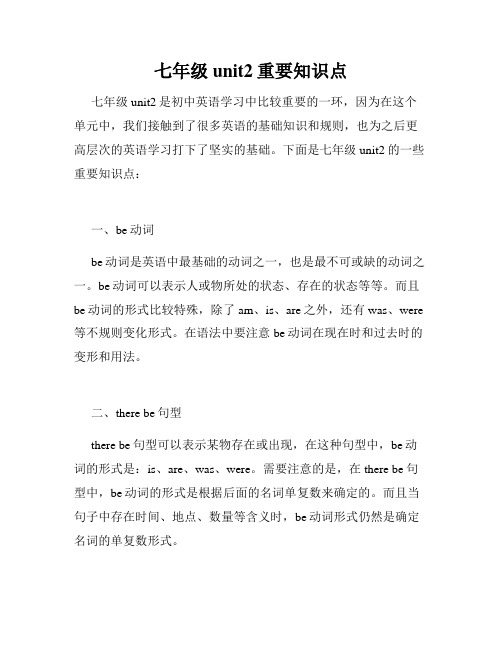
七年级unit2重要知识点七年级unit2是初中英语学习中比较重要的一环,因为在这个单元中,我们接触到了很多英语的基础知识和规则,也为之后更高层次的英语学习打下了坚实的基础。
下面是七年级unit2的一些重要知识点:一、be动词be动词是英语中最基础的动词之一,也是最不可或缺的动词之一。
be动词可以表示人或物所处的状态、存在的状态等等。
而且be动词的形式比较特殊,除了am、is、are之外,还有was、were 等不规则变化形式。
在语法中要注意be动词在现在时和过去时的变形和用法。
二、there be句型there be句型可以表示某物存在或出现,在这种句型中,be动词的形式是:is、are、was、were。
需要注意的是,在there be句型中,be动词的形式是根据后面的名词单复数来确定的。
而且当句子中存在时间、地点、数量等含义时,be动词形式仍然是确定名词的单复数形式。
三、形容词和副词形容词和副词是英语中比较重要的词性之一,它们可以对名词或者动词的程度或性质进行修饰。
在形容词和副词的用法中,需要注意形容词和副词的位置和常见的不规则形式等等问题。
四、名词和名词性物主代词名词是英语中最基础和最常见的词性之一,也是我们日常交流中最常使用的词性之一。
而名词性物主代词则可以代替名词,表示某个人、物、事物的所有权。
需要注意的是,名词性物主代词的形式是固定的,常见的形式是my、your、his、her、its、our、their等。
五、数字和单位数字和单位是我们在交流中必须使用的词汇之一,也是我们学习英语时必须会的词汇之一。
在数字和单位中,需要注意数字的读法和常见的度量单位等等问题。
此外,在进行口语表达时,还要注意习惯用语和地区差异等问题。
六、交际用语交际用语是我们在交流中必须使用的句子或表达方式,它们可以让我们更好的表达意思,更好地和人沟通。
在交际用语中,常见的说话方式包括问候、道歉、感谢、请求、建议等等。
unit2基础知识背诵
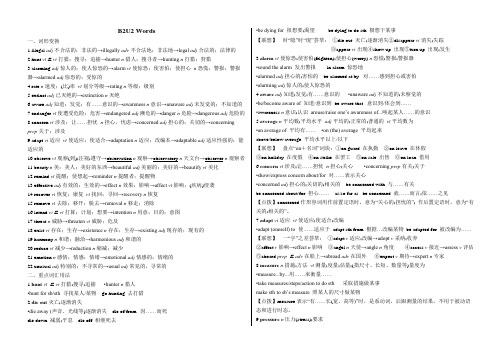
B2U2 Words一、词形变换1.illegal adj.不合法的;非法的→illegally adv.不合法地;非法地→legal adj.合法的;法律的2.hunt vt.& vi.打猎;搜寻;追捕→hunter n.猎人;搜寻者→hunting n.打猎;狩猎3.alarming adj.惊人的;使人惊恐的→alarm vt.使惊恐;使害怕;使担心n.恐慌;警报;警报器→alarmed adj.惊恐的;受惊的4.rate n.速度;(比)率vt.划分等级→rating n.等级;级别5.extinct adj.已灭绝的→extinction n.灭绝6.aware adj.知道;发觉;有……意识的→awareness n.意识→unaware adj.未发觉的;不知道的7.endanger vt.使遭受危险;危害→endangered adj.濒危的→danger n.危险→dangerous adj.危险的8.concern vt.涉及;让……担忧n.担心,忧虑→concerned adj.担心的;关切的→concerning prep.关于;涉及9.adapt vi.适应vt.使适应;使适合→adaptation n.适应;改编本→adaptable adj.适应性强的;能适应的10.observe vt.观察(到);注视;遵守→observation n.观察→observatory n.天文台→observer n.观察者11.beauty n.美;美人;美好的东西→beautiful adj.美丽的;美好的→beautify vt.美化12.remind vt.提醒;使想起→reminder n.提醒者;提醒物13.effective adj.有效的;生效的→effect n.效果;影响→affect vt.影响;(疾病)侵袭14.recover vi.恢复;康复vt.找回;寻回→recovery n.恢复15.remove vt.去除;移开;脱去→removal n.移走;消除16.intend vi.& vt.打算;计划;想要→intention n.用意;目的;意图17.threat n.威胁→threaten vt.威胁;危及18.exist vi.存在;生存→existence n.存在;生存→existing adj.现存的;现有的19.harmony n.和谐;融洽→harmonious adj.和谐的20.reduce vt.减少→reduction n.缩减;减少21.emotion n.感情;情感;情绪→emotional adj.情感的;情绪的22.unusual adj.特别的;不寻常的→usual adj.常见的,寻常的二、重点词汇用法1.hunt vt. & vi.打猎;搜寻;追捕•hunter n.猎人•hunt for sb/sth 寻找某人/某物go hunting 去打猎2.die out灭亡;逐渐消失•die away (声音、光线等)逐渐消失die of/from...因……而死die down 减弱;平息die off 相继死去•be dying for 很想要;渴望be dying to do sth 极想干某事【联想】时“隐”时“现”荟萃:①die out 灭亡;逐渐消失②disappear vi.消失;失踪③appear vi.出现④show up 出现⑤turn up 出现;发生3.alarm vt.使惊恐;使害怕(frighten);使担心(worry) n.恐慌;警报;警报器•sound the alarm 发出警报in alarm 惊恐地•alarmed adj.担心的;害怕的be alarmed at/by...对……感到担心或害怕•alarming adj.惊人的;使人惊恐的4.aware adj.知道;发觉;有……意识的•unaware adj.不知道的;未察觉的•be/become aware of 知道/意识到be aware that...意识到/体会到……•a wareness n.意识;认识arouse/raise one’s awareness of...唤起某人……的意识5.average n.平均数;平均水平adj.平均的;正常的;普通的vt.平均数为•an average of 平均有……•on (the) average 平均起来above/below average 平均水平以上/以下【联想】盘点“on+名词”词块:①on guard 在执勤②on leave 在休假③on holiday 在度假④on strike 在罢工⑤on sale 出售⑥on loan 借用6.concern vt.涉及;让……担忧n.担心;关心•concerning prep.有关;关于•show/express concern about/for 对……表示关心•concerned adj.担心的;关切的;相关的be concerned with 与……有关be concerned about/for 担心……as/so far as...be concerned 就……而言;依……之见【点拨】concerned作形容词用作前置定语时,意为“关心的;担忧的”; 作后置定语时,意为“有关的;相关的”。
人教版八年级英语上册Unit2知识点汇总总结
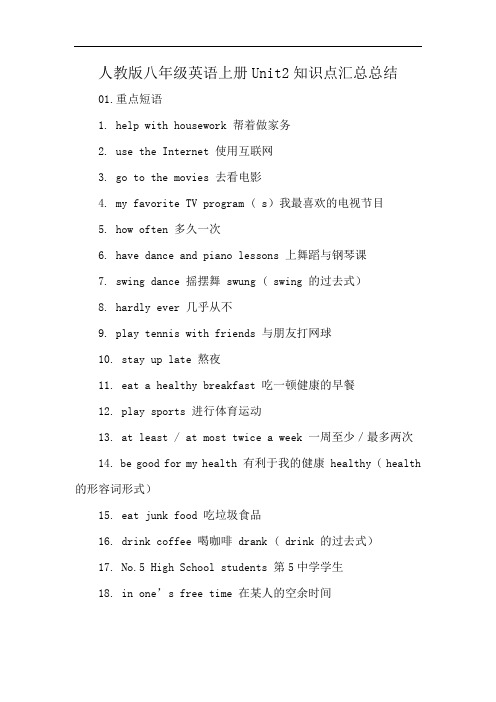
人教版八年级英语上册Unit2知识点汇总总结01.重点短语1. help with housework 帮着做家务2. use the Internet 使用互联网3. go to the movies 去看电影4. my favorite TV program ( s)我最喜欢的电视节目5. how often 多久一次6. have dance and piano lessons 上舞蹈与钢琴课7. swing dance 摇摆舞 swung ( swing 的过去式)8. hardly ever 几乎从不9. play tennis with friends 与朋友打网球10. stay up late 熬夜11. eat a healthy breakfast 吃一顿健康的早餐12. play sports 进行体育运动13. at least / at most twice a week 一周至少/最多两次14. be good for my health 有利于我的健康 healthy ( health 的形容词形式)15. eat junk food 吃垃圾食品16. drink coffee 喝咖啡 drank ( drink 的过去式)17. No.5 High School students 第5中学学生18. in one’s free time 在某人的空余时间19. ask them about their free time activities 询问他们关于他们的业余活动20. not … at all 根本不…21. go online 上网22. be surprised that ..感到惊讶23. use it for fun 为了取乐而使用它24. the answers to the questions 这些问题的答案25. one to three times a week 一周一到三次26. two percent of the students 2%的学生27. the best way to do sth.做某事的最好方式28. such as 例如29. spend time with your friends 与你的朋友共度时光spent ( spend 的过去式)30. spend time on sth./ in doing sth.花时间在某事上/做某事31. play together 一起玩32. watch TV for over 2 hours 看两个多小时电视33. go to the dentist 去看牙医34. a 16-year-old high school student 一名16岁的中学生35. have a lot of good habits 有许多好习惯36. more / less than two hours 多/少于两小时37. go to the dentist for teeth cleaning 去牙医处清洁牙齿38. go to the shopping center 去购物中心02.重点句子语法聚焦1. --What do you usually do on weekends?你在周末通常做什么?--I always exercise.我总是锻炼。
人教版九年级英语unit2知识归纳

人教版九年级英语unit2知识归纳人教版九年级英语unit2知识1单词Mooncake ['mu:nke?k] n. 月饼lantern [?l?nt? (r)n] n. 灯笼stranger [?streind?? (r)] n. 陌生人relative [?rel?tiv] n. 亲属;亲戚put on 增加(体重);发胖pound [paund] n. 磅(重量单位);英镑folk [f?uk] adj. 民间的;民俗的goddess [?g?des][?ɡɑd?s] n. 女神whoever [hu:?ev? pron.无论是谁;不管谁;任何人steal [sti:l] v. (stole [st?ul], stolen [st?ul?n]) 偷;窃取lay [lei] v. (laid [leid], laid) 放置;产(卵)lay out 摆开;布置dessert [di?z?:(r)t] n.( 饭后)甜点;甜食garden [ga:(r)dn] n. 花园;园子 tradition [tr??d??n] n.传统admire [?d?mai? (r)] v. 欣赏;仰慕tie [tai] n. 领带 v. 捆;束haunted [?h?:ntid] adj.有鬼魂出没的 ghost [g?ust] n. 鬼;鬼魂trick [trik] n. 花招;把戏treat [tri:t] n. 款待;招待;请客spider [?spaid?r)] n. 蜘蛛Christmas [?krism?s] n. 圣诞节lie [laI] v. (lay [leI],lain [leIn]) 存在;平躺;处于novel [?n?vl] [?na:vl] n.(长篇)小说eve [i:v] n.(尤指宗教节假日的)前夕;前夜dead [ded] adj.死的;失去生命的business [?bizn?s] n. 生意;商业punish [?p?nis] v. 处罚;惩罚 warn [w?:(r)n] v. 警告;告诫end up 最终成为;最后处于present [preznt] n. 现在;礼物 adj. 现在的nobody [n?ub?di] [n?uba:di] pron. 没有人 warmth [w?:(r)mθ] n. 温暖;暖和spread [spred] v. 传播;展开 n. 蔓延;传播Macao [m??kau] 澳门Chiang Mai [?t?i?n?maI], [d?a:nmaI] 清迈(泰城市)Water Festiwal 泼水节Mid-Autumn中秋节Mother's Day母亲节Father's Day 父亲节Halloween [?h?l?u?i:n] 万圣节前夕A Christmas Carol 《圣诞欢歌》(小说名)Easter 复活节Clara [?kla:r?] [?kler?] 克拉拉(女名)Santa [?s?nt?] Claus [kl?:z] 圣诞老人Charles [t?a:(r)lz] Dickens [?dik?nz] 查尔斯 ? 狄更斯(英)Scrooge [skru:d?] 斯克鲁奇 n.(非正式)吝啬鬼Jacob [?d?eik?b]Marley [?ma:(r)li] 雅各布 ? 马利人教版九年级英语unit2知识2知识梳理【重点短语】1.put on 增加(体重);发胖2.care about 关心; 在乎3.end up 最终成为,最后处于4.not only ……but also……不但……而且……5.shoot down 射下ed to do 过去常常做……7.remind sb. of 使某人想起8.give out 分发发放9.the water festival 泼水节10.the Chinese spring festival 中国春节11.next year 明年12.sound like 听起来像13.each other 互相彼此14.in the shape of 以……的形状15.on mid-autumn night 在中秋之夜16.fly up to 飞向y out 摆开布置18e back 回来19.as a result 结果因此20.Mother’s day 母亲节21.more and more popular 越来越受欢迎22.think of 想起 ;认为 ;思考23.dress up 装扮穿上盛装24.the importance of ……的重要性25.make money 挣钱26.in need 需要帮助处于困境中27.between …and…在……和……之间28.the dragon boat festival 龙舟节29.the lantern festival 元宵节30.like best 最喜欢31.go to …for a vacation 去……度假32.be similar to 与……相似33.wash away 冲走洗掉34.Mid-autumn festival 中秋节35.shoot down 射下36.call out 大声呼喊37.the tradition of ……的传统38.at night 在夜里; 在晚上39.one…,the other…一个……,另一个…...40.Father’s day 父亲节【重点句型】1. I think that they’ re fun to watch.我认为它们看着很有意思。
七年级上册英语unit2知识点归纳

七年级上册英语unit2知识点归纳本文将为大家归纳整理七年级上册英语Unit 2的知识点,旨在帮助学生更好地掌握这一单元所学内容。
一、重点词汇1. wake up:醒来例如:I usually wake up at six o'clock in the morning.2. get up:起床例如:I get up after I wake up.3. have breakfast/lunch/dinner:吃早/午/晚饭例如:I usually have breakfast at seven o'clock in the morning.4. go to school:去上学例如:I usually go to school by bus.5. do homework:做作业例如:I always do my homework after school.6. watch TV:看电视例如:I like to watch TV in the evening.二、动词时态1. 一般现在时例如:I usually wake up at six o'clock in the morning.2. 现在进行时例如:I am doing my homework now.3. 一般过去时例如:I went to the park yesterday.4. 过去进行时例如:I was watching TV when my friend called me.三、日常生活用语1. 问候例如:How are you?2. 对话例如:A:What time do you usually wake up?B:I usually wake up at six o'clock in the morning.3. 请求例如:Can you help me with my homework?4. 命令例如:Clean your room, please.四、其他重要知识点1. 序数词例如:first,second,third,fourth,fifth,sixth,seventh,eighth,ninth,tenth2. 人称代词例如:I,you,he,she,it,we,they总之,七年级上册英语Unit 2的知识点主要包括了一些基础的英语词汇、动词时态和常用口语表达等方面,希望大家通过本文的学习,能够更加熟练地运用这些知识点,从而提高自己的英语水平。
人教版九年级英语unit2重点知识

九年级unit2重点知识1. strange adj. 陌生的,奇怪的stranger n. 陌生人2. put on 增加(体重),发胖; 穿上eg: She never puts on weight.她从来不会发胖。
Today is cold, put on your coat.今天很冷,穿上你的外套。
3.pound n. 磅(重量单位) eg: five pounds4. folk adj. 民间的,民俗的eg: folk music 民谣5. god n. 神goddess n. 女神6. whoever无论谁, 不管什么人eg: Whoever comes will be welcome.无论谁来都会受欢迎。
I won't open the door, whoever you are.无论你是谁,我都不会开门。
7. steal v. 偷stole stolenA thief stole my wallet.一个小偷偷了我的钱包。
8. lay v. laid 放置,安放; 产卵,下蛋eg: Please lay the trials in the office.请把这些椅子放到办公室。
The hens lay eggs every day.这些母鸡每天下蛋。
9. lay out 摆开, 布置10. tradition n. 传统traditional adj. 传统的traditionally adv. 传统地a tradition of... ...的传统11. admire v. 欣赏, 仰慕, 钦佩eg: I admire her.12. tie n. 领带v. 捆, 绑eg: He always wears a tie.They tie the bad man to a tree.13. trick n. 花招, 把戏play a trick on sb 戏弄某人14. treat n. 款待,招待; v. 招待, 请客eg: Thanks for your treat.15. lie v. 存在, 平躺, 处于eg: Hai Nan lies in the south of China.海南位于中国南部。
七年级上册人教英语Unit2知识点

七年级上册人教英语Unit2知识点七年级上册人教英语Unit2主要讲了家庭成员的关系和家庭成员的职业,以下是该单元的知识点总结和重点解析。
一、家庭成员的称呼在英语中,家庭成员之间相互称呼非常重要,以下是几种家庭成员的称呼:1. 父亲:father/dad/daddy2. 母亲:mother/mom/mummy3. 儿子:son4. 女儿:daughter5. 兄弟:brother6. 姐妹:sister7. 祖父:grandfather/grandpa8. 祖母:grandmother/grandma9. 丈夫:husband10. 妻子:wife二、家庭成员的职业在英语中,我们也可以用职业来表述家庭成员,以下是几种常见的家庭成员职业表述方式:1. 爸爸的职业:My father is a teacher.2. 妈妈的职业:My mother is a doctor.3. 儿子的职业:My son is a student.4. 女儿的职业:My daughter is a musician.5. 祖父的职业:My grandfather is retired.6. 祖母的职业:My grandmother is a housewife.7. 兄弟的职业:My brother is a lawyer.8. 姐妹的职业:My sister is a nurse.三、家庭成员的关系在家庭成员之间,除了称呼和职业之外,还会有一些特定的关系词汇,在英语中,以下是几种常见家庭成员关系的表述方式:1. 父亲:father/dad/daddy2. 母亲:mother/mom/mummy3. 儿子:son4. 女儿:daughter5. 祖父:grandfather/grandpa6. 祖母:grandmother/grandma7. 外祖父:grandfather on my mother's side8. 外祖母:grandmother on my mother's side9. 姑妈:aunt10. 叔叔:uncle11. 堂兄弟:cousin (male)12. 堂姐妹:cousin (female)13. 姐夫:brother-in-law14. 妹夫:sister-in-law15. 儿媳妇:daughter-in-law16. 女婿:son-in-law四、疑问词的使用在英语中,疑问词是我们进行问答的重要工具,在家庭成员的讨论中,以下是几种常见的疑问词使用方式:1. who:用来询问家庭成员是谁,比如,Who is your father?2. what:用来询问家庭成员的职业和爱好,比如,What does your mother do?3. when:用来询问家庭成员的生日和重大事件,比如,Whenis your sister's birthday?4. where:用来询问家庭成员的地址和旅游地点,比如,Where does your uncle live?5. why:用来询问家庭成员的理由和动机,比如,Why did your brother choose to study law?五、口语练习最后,在学习了以上知识点之后,我们可以通过口语练习来巩固我们的学习成果。
人教版初中英语新教材七年级上Unit2知识点归纳总结(复习必背)

Unit 2 We’re family !学习目标单元主题人与社会→社会服务与人际沟通→和谐家庭必备单词Section A1.mean/mi:n/v.意思是;打算2.husband/'hʌzbənd/n.丈夫3.bat/bæt/n.球棒;球拍4.together/tə'geðə(r)/adv.在一起;共同5.spend/spend/v.花(时间、钱等)6.really/'ri:əli/adv.非常;确实;真正地7.member/'membə(r)/n.成员;会员8.activity/æk'tɪvəti/n.活动9.chess/tʃes/n.国际象棋10.funny/'fʌni/adj.好笑的;奇怪的→fun(n.乐趣)11.laugh/la:f/v.笑;发笑n.笑声12.different/'dɪfrənt/adj.不同的→difference(n.差别;不同)13.violin/,vaɪə'lɪn/n.小提琴Section B1.hat/hæt/n.帽子2.handsome/'hænsəm/adj.英俊的3.knee/ni:/n.膝;膝盖4. grandchild /'græntfaɪld/ n.(pl.grandchildren /'græn,tʃɪldrən/) (外)孙子;(外)孙女5.son/sʌn/n.儿子6.hike/haɪk/v.&n.远足;徒步旅行高频短语e in 进来2.ping-pong bat乒乓球拍3.play ping-pong打乒乓球4.every day每天5.fishing rod钓竿6.a lot of/lots of大量;许多7.Chinese chess中国象棋8.play the erhu 拉二胡9.big and clean classroom 又大又干净的教室10.have fun 玩得11.on the left/right 在左边/右边12.at night在夜晚13.in the middle 中间,中部14.go hiking远足15.family photo 家庭照片16.every week 每周17.next to紧邻;在……近旁18.family tree 家谱常考句型1.询问家庭成员:(1)-Is this/Are these your...?这是/这些是你的······吗?-Yes,.../No,...是的,······/不,······(2)-Who's/Who're...?······是谁?-He's/She's/They're...他是/她是/他(她)们是·······2.询问日常发生的事:-Do you often play ping-pong together?你们经常一起打乒乓球吗?-Yes,we play every day/week.是的,我们每天/每周都打。
Unit2 How often do you exercise 知识点总结

Unit2 How often do you exercise? 知识点总结一、单词和短语1.How often......? 多久一次?How often 常对every day,always,usually,often,sometimes,hardly ever,never,once a week,twice 等表示频度副词或短语进行提问。
2.help v./n. 帮助A.作动词,相关短语:①.help sb. with sth. 在某方面帮助某人②. help sb. (to) do sth. 帮助某人做某事③. help oneself to sth. 请自便④.can’t help doing sth. 情不自禁做某事Eg. My brother helps me with my English. = My brother helps me learn English.我的弟弟帮我学习英语。
He can’t help crying when watching the love movie. 他看这个爱情电影时情不自禁哭了。
Please help yourself to the drinks. 请自取饮料酒水。
3.4.5.频度副词频率排序:always>almost always>usually>often>sometimes>seldom>hardly ever>almost never>never6.once 副词,一次;曾经;一旦A.作副词,意为“一次”,表示频率,常用来回答how often的提问。
Eg. —How often do you go shopping? —Once a week.B.作副词,意为“曾经”,表时间,常与一般过去时连用。
Eg. He once lived in Beijing,China. 他曾经住在中国北京。
人教版九年级英语unit2知识要点
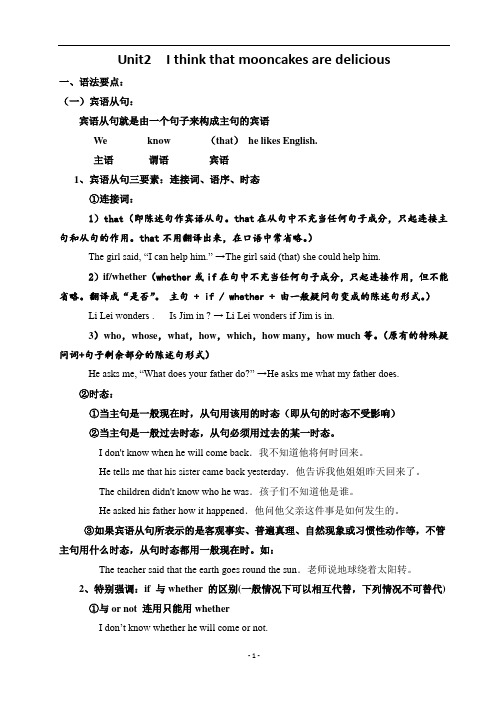
Unit2 I think that mooncakes are delicious一、语法要点:(一)宾语从句:宾语从句就是由一个句子来构成主句的宾语We know (that)he likes English.主语谓语宾语1、宾语从句三要素:连接词、语序、时态①连接词:1)that(即陈述句作宾语从句。
that在从句中不充当任何句子成分,只起连接主句和从句的作用。
that不用翻译出来,在口语中常省略。
)The girl said, “I can help him.”→The girl said (that) she could help him.2)if/whether(whether或if在句中不充当任何句子成分,只起连接作用,但不能省略。
翻译成“是否”。
主句 + if / whether + 由一般疑问句变成的陈述句形式。
)Li Lei wonders . Is Jim in ? → Li Lei wonders if Jim is in.3)who,whose,what,how,which,how many,how much等。
(原有的特殊疑问词+句子剩余部分的陈述句形式)He asks me, “What does your father do?”→He asks me what my father does.②时态:①当主句是一般现在时,从句用该用的时态(即从句的时态不受影响)②当主句是一般过去时态,从句必须用过去的某一时态。
I don't know when he will come back.我不知道他将何时回来。
He tells me that his sister came back yesterday.他告诉我他姐姐昨天回来了。
The children didn't know who he was.孩子们不知道他是谁。
He asked his father how it happened.他问他父亲这件事是如何发生的。
人教版八年级下册英语第二单元unit2知识点

人教版八年级下册英语第二单元unit2知识点Unit 2 What should I do?一丶重点短语1.argue v.争论;争吵argue with sb.与某人吵架I argued with my best XXX.我和我的好朋友吵架了。
2.① XXX.(用于否定句)也He doesn’t have any money。
and I don’t。
either.他没有钱,我也没有。
I can’t play chess。
She can’t。
either.我不会下国际象棋,她也不会。
② too 也(用于肯定或疑问句)I’m XXX a XXX。
too.我是老师,他也是老师。
3.ask (sb.)for sth.向某人寻求某物;要……Don't ask for food every day.Go and find some work.别天天要饭,找点儿工作做。
I don’t think you should ask your parents for some money.我想你不应向父母要钱。
4.the same as。
与……相同(注意前后两个比较对象的属性保持一致)XXX same asmy friends'.这些衣服与我朋友的一样。
Tom is the same age as Anna.=Tom is as old as Anna.汤姆和XXX一样大。
Her backpack is the same as XXX.她的背包与我的一样。
5.except除……之外;(不包孕……在内)My class has been XXX.除我之外,我的同砚都被约请了。
All the students went to the park except him.除他之外,部分同砚都去过公园了。
XXX.除了她以外,所有的学生都去美国旅行过。
注意区别:besides除……以外,还有。
(包括在内)We all went there besides him.除他去以外,我们也都去了。
新人教版高中英语必修二 Unit 2 Wildlife Protection单元知识点

【知识点汇总】新人教版必修二Unit 2 Wildlife Protection【词汇短语】1. Our planet’s wildlife is dying ou t at an alarming rate. (P14)我们星球上的野生动植物正以惊人的速度灭绝。
die out 灭亡;逐渐消失【例句】因栖息地正受到破坏,这一物种已濒临灭绝。
【拓展】die off 相继死去be dying for sth. 渴望某物die from/of ... 死于……die down 逐渐变弱,逐渐平息be dying to do sth. 渴望做某事die away 逐渐减弱,逐渐消失2. Our planet’s wildlife is dying out at an alarming rate. (P14)我们星球上的野生动植物正以惊人的速度灭绝。
rate /reɪt/ n. 速度;(比)率vt. 划分等级【搭配】at a(n) ... rate 以……速度interest rates 利率the birth/death rate 出生率/死亡率a high success/failure rate 很高的成功率/失败率【例句】婴儿成长的速度并非一成不变,而是长长停停,停停长长。
她目前排名世界第二。
【拓展】后缀-rate表示“程度;水平(与first、second等词连用,表明你认为某物属于哪种程度或水平)”。
这所学校培养出很多一流学生。
它是这个城市中评价最好的旅馆之一,这是有充分理由的。
(2021·新高考卷)3. We must make people aware of the problem and help protect the endangered wildlife before it’s too late! (P14)我们必须趁现在还来得及让人们意识到这个问题,帮助保护濒临灭绝的野生动植物!aware /ə'weə(r)/ adj. 知道;发觉;有……意识的【搭配】make sb. aware of ... 使某人知道/意识到……be/become/feel aware of/that ... 知道/意识到……as far as I’m aware ( =as far as I know) 据我所知【例句】我们应该知道许多动物濒临灭绝。
牛津7A知识重牛津7A知识重点Unit 2

牛津7A知识重点Unit 2Welcome1.real adj. ---- really adv..a real car一辆真车. I am really sorry.我真的抱歉。
.true adj.a true story一个真实的故事. a true story about a real person真人真事2.walk to my bowl = go to my bowl on foot走到我的碗那儿去.ride(a bike) to school = go to school by bike= go to school on a bike 3. I walk to my bowl many times a day.(提问)---- How often do you walk to your bowl?.I go swimming every week. (提问)---- How often do you go swimming?4.球类、棋类运动不加the.play volleyball/ basketball/ tennis/ table tennis/ football/badminton . play (Chinese) chess注意:play with a ball玩球西洋乐器加the.play the piano/ violin5. be good at / do well in +doing…. like/ love/ enjoy +doing…6.What’s your favourite sport?你最喜欢的运动是什么?= What sport do you like best?7.What/ How about+ sth. ?What about some milk?来些牛奶怎么样?What/ How about+doing sth?What about doing some shopping?购物怎么样?What/ How about+ 代词宾格?What about them?他们呢?. ex.My dog is yellow. What about ____________ (you)?Reading1.my favourite foot ball player 我最喜欢的足球选手one’s favourite…某人最喜爱的。
八年级上册unit2知识要点
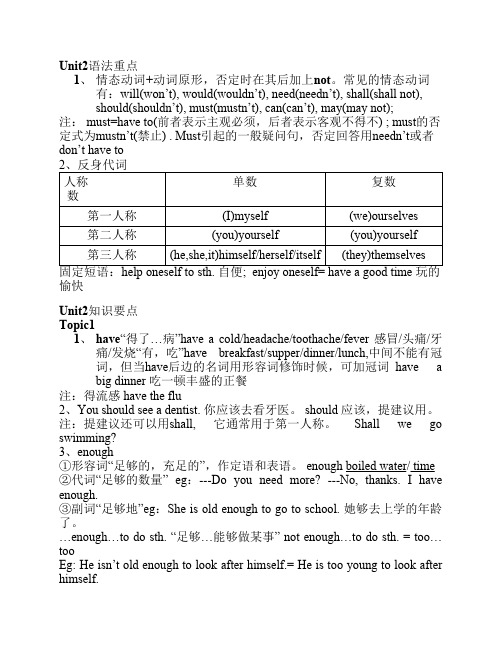
动词作主语时要变成动名词或者是动词不定式,谓语动词用单数形式。
2、 before meals 饭前; after meals 饭后; after dinner 晚饭后
(主将从现)
eg: We will return to school as soon as the summer holiday is over.
11、 be surprised to do “对…感到惊讶” I was surprised to hear the
news.
12、 keep后接形容词/动名词表示“让某人/某物处于某种状态”。如:
去做
3、prevent/keep/stop “阻止/阻挠…做某事” keep/stay away from… 远 离… 4、ring sb. up = call sb. up = give sb. a call/call sb. 打电话 5、leave a message (to sb.) 留口信take a message for sb.=give sb. a message 捎口信
注: must=have to(前者表示主观必须,后者表示客观不得不) ; must的否 定式为mustn’t(禁止) . Must引起的一般疑问句,否定回答用needn’t或者 don’t have to 2、反身代词
人称 数
f
(we)ourselves
第二人称
(you)yourself
②作名词:原因,起因(可数);理由,缘故(不可数)
eg:Drunk driving is one of the most common causes of traffic accidents.
七年级上册英语Unit2知识点归纳总结

七年级英语上册Unit2知识点归纳总结Unit2 Topicl I have a small nose・一、重点词汇1・反义词:small ・ big/large long -short black -white tall ・short new - oldyour/his/her favorite film star 我的/你的/他的/她的最喜爱的电影明星from =be from来自、出生于different长得不像the same grade/school 在同一个年级 / 学校in different grades/schools 在不同年级/学校6・have / has有;吃;喝You have big eyes. She has small eyes•你有一双大眼睛。
她有一双小眼睛。
长的long hair 长头发短的short hair短头发9. big大的big nose大鼻子10. small小的small nose小鼻子11. round 圆的round face 圆圆的脸12. wide 宽的wide face 宽宽的脸13. we 我们We have small mouths.我们都有小嘴巴。
二、重点句型have a big nose = My nose is big.I have big eyes・二My eyes are big.She has a big nose・二Her nose is big・She has big eyes・二Her eyes are big・2.Who's that boy那个男孩是谁这是由Who引导的特殊疑问句,询问某人的身份。
如:Who's that girl over thereWho1 s是Who is的缩写形式。
名词和代词和am Js ,are ,have ,has形的连词都可以使用缩写式。
助动词和情态动词的否定形式也可以缩写。
部编版五年级上册英语第二单元知识总结-Unit 2知识总结
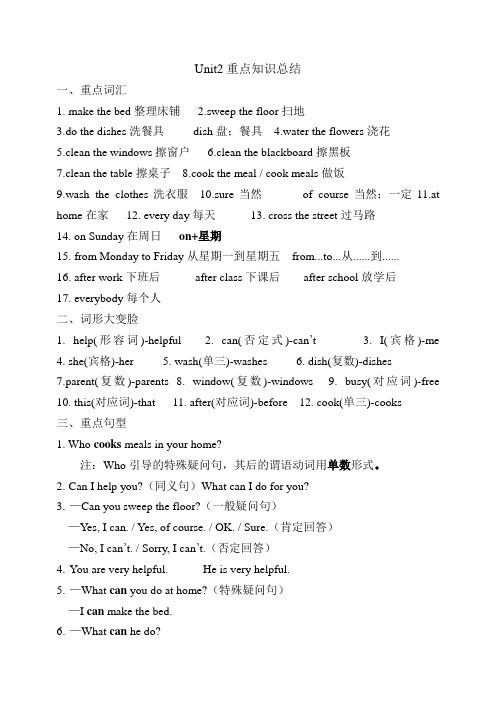
Unit2重点知识总结一、重点词汇1.make the bed整理床铺2.sweep the floor扫地3.do the dishes洗餐具dish盘;餐具4.water the flowers浇花5.clean the windows擦窗户6.clean the blackboard擦黑板7.clean the table擦桌子8.cook the meal / cook meals做饭9.wash the clothes洗衣服10.sure当然of course当然;一定11.at home在家12. every day每天13. cross the street过马路14. on Sunday在周日on+星期15. from Monday to Friday从星期一到星期五from...to...从......到......16. after work下班后after class下课后after school放学后17. everybody每个人二、词形大变脸1. help(形容词)-helpful2. can(否定式)-can’t3. I(宾格)-me4. she(宾格)-her5. wash(单三)-washes6. dish(复数)-dishes7.parent(复数)-parents 8. window(复数)-windows 9. busy(对应词)-free10. this(对应词)-that 11. after(对应词)-before 12. cook(单三)-cooks三、重点句型1. Who cooks meals in your home?注:Who引导的特殊疑问句,其后的谓语动词用单数形式。
2.Can I help you?(同义句)What can I do for you?3.—Can you sweep the floor?(一般疑问句)—Yes, I can. / Yes, of course. / OK. / Sure.(肯定回答)—No, I can’t. / Sorry, I can’t.(否定回答)4.You are very helpful. He is very helpful.5.—What can you do at home?(特殊疑问句)—I can make the bed.6.—What can he do?—He can sweep the floor.7.I often help my mother do the dishes.help sb(某人) do sth(某事). 帮助某人做某事8.I often help to clean the table. help to do sth. 帮助做某事9.Can you help me cook the meal?10.Let me try. let sb do sth. 让某人做某事11.My parents go to work from Monday to Friday.12.I’m happy to be helpful at home.四、句型转换1.I can make the bed.(变一般疑问句)☆思路:有情态动词can,变一般疑问句,把它提到句首,I变you.答案:Can you make the bed?2.I can make the bed.(划线部分提问)☆思路:由于划线部分是“动词短语”,因此用“what...do”提问。
- 1、下载文档前请自行甄别文档内容的完整性,平台不提供额外的编辑、内容补充、找答案等附加服务。
- 2、"仅部分预览"的文档,不可在线预览部分如存在完整性等问题,可反馈申请退款(可完整预览的文档不适用该条件!)。
- 3、如文档侵犯您的权益,请联系客服反馈,我们会尽快为您处理(人工客服工作时间:9:00-18:30)。
2015-2016学年(下)四年级英语单元重点、练习(Umit2)班别__________姓名___________语法导学:(一)There be(is\are)句型的一般疑问句及其回答。
肯定回答:Yes, there is.Is there + 单数+ …?否定回答:No, there isn’t例如:Is there a library in your school? Yes, there is. / No, there isn’t.你们学校有一个图书馆吗?是的,有。
/ 不,没有。
肯定回答:Yes, there are.Are there + 复数+ …?否定回答:No, there aren’t.例如:Are there three books on the desk? Yes, there are. / No, there aren’t.桌子上有三本书吗?是的,有。
/ 不,没有。
(二)重点句型:Is there a living room in your new home? Yes, there is.We’re moving to a new home.Be happy / careful.It’s a nice new home.There is a bedroom for everyone. Is there a bedroom for me?There isn’t a garden.I like our new home.What about a dining room?关联复习:类别单词或词组房间名称及家庭设施living room 客厅dining room 餐厅bedroom 卧室kitchen 厨房bathroom 浴室garden 花园形容词new 新的nice 好看beautiful 漂亮happy 高兴快乐演练( Unit2 )一、看图写单词_______________ ______________ ______________________________ _______________ _______________二、填上所缺字母完成单词拼写,并写出中文意思。
1. g__rd_n ( )2. k__tch__n ( )3. b__d r__ __m ( )4. b__thr__ __m ( )5. l__v__ng room ( )6. d__n__ng room( )三、选择填空。
( ) 1._______there a bathroom in your home?A. BeB. AreC. Is( ) 2. There_________ four bedrooms in my home.A. isn’tB. aren’tC. is( ) 3.There is a bedroom________ everyone.A. inB. onC. for( ) 4. ________ gardens are there in your new home? Four.A. How muchB. WhatC. How many( ) 5._______ there a living room in your home? Yes, there_______.A. Are, aren’tB. Is, isC. Is , isn’t( ) 6. How many __________ are there? There are two.A. bathroomB. a bathroomC. bathrooms( ) 7. There _______ a big garden in my house, but there is a small one.A. isB. isn’tC. aren’t( ) 8. Is there a garden in your new home? ______________A. Yes, it is.B. Yes, there is .C. Yes, there are.( ) 9. Are there two bathrooms in your new home?________.A. Yes, there is.B. Yes, there are. C, No ,there aren’t.( )10. There isn’t a garden__________ there are four bedrooms.A. andB. butC. or四、情景选择题。
()1.当珍妮不高兴的时候,你会对她说:________A. Be nice, Jenny.B. Be unhappy, Jenny.C. Be happy, Jenny. ( )2.爸爸说每个人都会有一间卧室,他会说:A.There is a bedroom for everyone,B. There is a living room for everyone.C. There is a bathroom for everyone. ( )3. Tony想知道厨房怎么样,他会问爸爸:A.How is a kitchen? B. What about a garden? C. What about a kitchen? ( )4.在我们的新家有一间厨房但是没有花园,应该怎么说:A. There is a garden but there isn't a kitchen in my new home.B. There isn't a kitchen but there is a garden in my new home.C. There is a kitchen but there isn't a garden in my new home.( )5.妈妈告诉我要搬新家,但是我不喜欢,我会怎么说:A.I like my new home. B. I don’t like my home. C. Is there a bedroom for me?五、模仿例句写句子。
Model A: Is there a dining room in your new home? Yes, there is .1.three bedrooms, no________________________________________________2.living room, no___________________________________________________ Model B: How many bedrooms are there in your home? There are three.1.bathroom, two__________________________________________________2.kitchen, one_____________________________________________________六、连词成句。
1. are, we, new, home, moving, a, to ( . )___________________________________________________________ 2. garden, there, isn’t, a, my, in, home( . )___________________________________________________________ 3. like, new, I, our, home( . )___________________________________________________________4. a, everyone, there, for, is, bedroom ( ? )___________________________________________________________ 5. many, living rooms, how, there, are, in, home, your ( ? )___________________________________________________________ 七、看图完成句子。
(1)(2)(3)(4)1. Is there a _________________ in your home? Yes, there___________.2. How many_____________ are there in your home? There _________three.3.Are there four _______________ in your new home? No, there___________.4. There __________ a ____________ in my new home.八、回答问题。
1. Is there a big living room in your home?_________________________________2. Is there a garden in your home?_______________________________________3. How many bedrooms are there in your home?_____________________________4. Do you like your home?______________________________________________5. Are there four bathrooms in your home?________________________________九、根据短文内容判断对错。
对的写“T”,错得写“F”。
Hello!My name’s Zhuli. We are moving to a new home tomorrow. It’s beautiful and big. There are four bedrooms, a living room, a big dining room and a big kitchen in my new home. There are four bathrooms for everyone. But I’m sorry that there isn’t a garden. I like my new home.( )1.Zhuli are moving to a new school.( )2.Zhuli’s new home is very nice.( )3.There isn’t a kitchen in Zhuli’s new home.( )4.There are four bedrooms and four bathrooms.( )5.The is a small dining room.。
